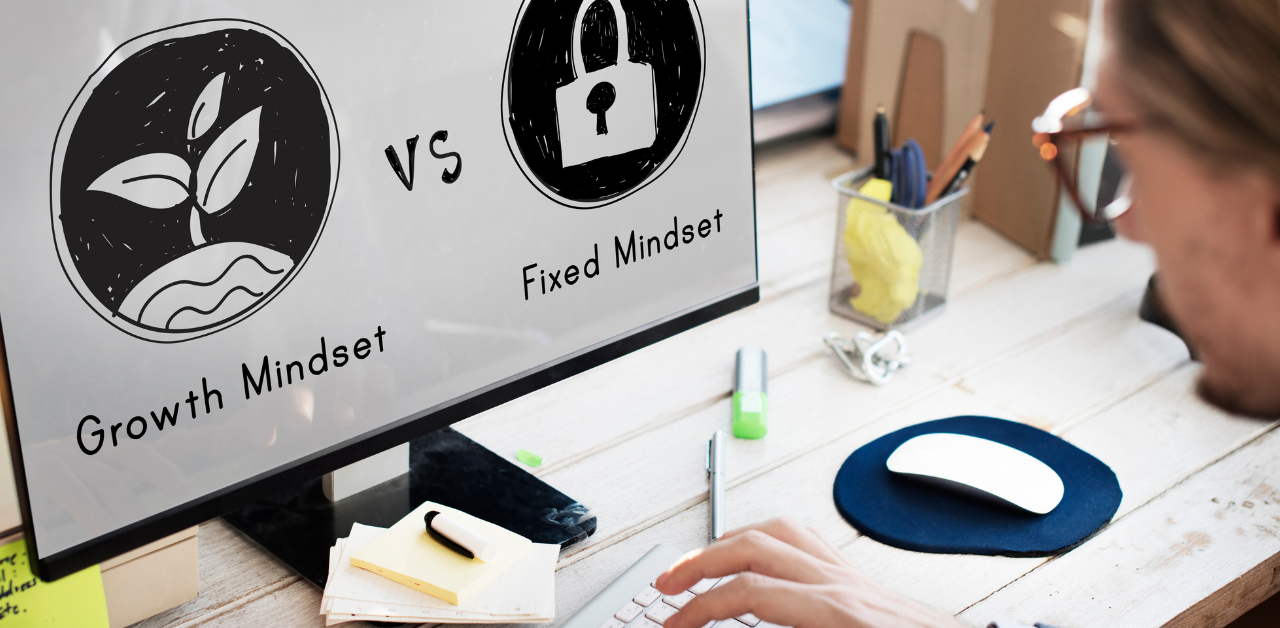Developing a growth mindset for personal and professional
A growth mindset development is the belief that individuals can develop their abilities and intelligence through dedication and hard work. In contrast, a fixed mindset assumes that an individual’s intelligence and abilities are fixed and cannot be improved upon. Developing a growth mindset can have a significant impact on personal and professional growth by increasing resilience, improving performance, and fostering a desire for lifelong learning. In a rapidly changing world, possessing a growth mindset is essential for success. Cultivating this mindset involves embracing challenges, learning from mistakes, seeking feedback, and persevering through difficult times. With dedication and practice, anyone can develop a growth mindset and unlock their full potential, both personally and professionally.
Identify areas where you have a fixed mindset:
Think about the areas in your life where you tend to give up easily or feel defeated. This could be in your personal or professional life. Having a fixed mindset means believing that your abilities and qualities are fixed traits that cannot be changed or improved upon. This can lead to a fear of failure and a reluctance to take on new challenges. Identifying areas where you have a fixed mindset can help you begin to develop a growth mindset, which involves believing that your abilities can be developed through dedication and hard work.
Challenge your fixed mindset beliefs:
Once you’ve identified areas where you have a fixed mindset, challenge those beliefs. For example, if you believe that you’re not good at math and will never be able to improve, challenge that belief by finding ways to improve your math skills. To develop a growth mindset, you must challenge your fixed mindset beliefs by recognizing when you are avoiding challenges or giving up easily due to a fear of failure. Instead, embrace challenges as opportunities to learn and grow, and see failures as temporary setbacks that can provide valuable feedback for improvement.
Embrace challenges:
Start looking at challenges as opportunities to learn and grow. Instead of avoiding challenges, embrace them and use them as a chance to develop new skills. A growth mindset development involves embracing challenges as opportunities for learning and growth, both personally and professionally. Instead of shying away from challenges, a growth mindset encourages individuals to view them as chances to develop new skills, gain experience, and ultimately achieve success. By embracing challenges with a positive attitude and a willingness to learn, individuals can develop resilience, creativity, and a passion for continuous self-improvement.
Learn from failure:
Failure is a natural part of learning and growth. When you fail, take the opportunity to reflect on what went wrong and what you can do differently next time. Developing a growth mindset involves embracing failure as an opportunity to learn and grow. Rather than fearing failure, individuals with a growth mindset development see it as a necessary step towards achieving their goals. This mindset allows for greater resilience, creativity, and adaptability in both personal and professional contexts.
Focus on effort over outcome:
Instead of focusing solely on the outcome, focus on the effort you put in. Recognize and celebrate your hard work and progress, even if you don’t achieve the desired outcome. Developing a growth mindset involves focusing on effort over outcome. Instead of just aiming for a particular result, a growth mindset focuses on the learning process, taking risks, and embracing challenges. This helps to develop resilience and a resources of career counseling, willingness to learn from mistakes, leading to personal and professional growth.
Cultivate a love of learning:
Make a commitment to lifelong learning. Continuously seek out new knowledge and skills that can help you grow personally and professionally. Developing a growth mindset involves embracing challenges, persisting through obstacles, and seeing failure as an opportunity to learn and improve. By adopting this approach, individuals can develop a love of learning as they recognize that their abilities can be developed and strengthened over time with effort and dedication.
Surround yourself with growth-minded people:
Surrounding yourself with people who have a growth mindset can help you stay motivated and inspired. Surrounding yourself with growth-minded people can help you develop a growth mindset by exposing you to their positive attitudes towards challenges and opportunities for learning and growth. Their support, encouragement, and willingness to share knowledge and experiences can inspire and motivate you to embrace challenges, learn from failures, and continuously improve yourself.
By following these steps, you can develop a growth mindset that will help you achieve personal and professional growth. Remember that developing a growth mindset is a lifelong journey, and it takes time and effort to make it a habit.
Conclusion:
Developing a growth mindset is crucial for achieving personal and professional success. It involves believing that abilities and skills can be developed through hard work, dedication, and perseverance. With a growth mindset, challenges are viewed as opportunities to learn and grow, rather than as obstacles to be avoided. Individuals with a growth mindset are more likely to take risks, embrace failure as a natural part of the learning process, and persist in the face of adversity. Ultimately, a growth mindset leads to greater resilience, adaptability, and overall success in all areas of life.
FAQs:
How do you develop a professional growth mindset?
To develop a professional growth mindset, focus on learning and improvement rather than on innate talent or intelligence. Embrace challenges, seek feedback, and persist through obstacles. View mistakes as opportunities to learn and develop new skills, and continually seek new knowledge and experiences.




